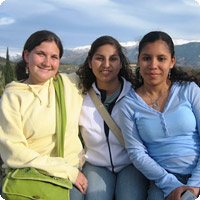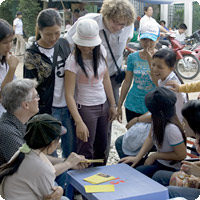Frequently Asked Questions




Why does EMU put so much energy into cultural learning?
The intercultural program is a cornerstone of the undergraduate experience at EMU. While the intercultural experience takes a lot of time and energy to pull together, participating students become part of learning experiences that shape them and their decisions for years to come. Many of our highly-accomplished alumni cite learning from intercultural travel that led to a career path or made them a strong candidate for a job: adaptability, decision-making, critical thinking, empathy, interpersonal communication and problem-solving skills. Whether you plan to teach, run a business, provide healthcare or social services, cultural understanding of others will strengthen your impact.
Who can participate?
All undergraduate students at EMU are eligible to participate. In fact, EMU is one of the only universities in the U.S. that requires all students to do some form of intercultural study. This shapes our campus, our classrooms, and our lifestyles.
Why the change from intercultural to intercultural learning?
EMU’s intercultural program is designed to develop cultural understanding and global awareness through an experience of living and learning in a different culture. The focus of the program is to learn from and with others, which goes beyond and is more interactive than learning about others. Across four decades of educational travel, how we understand what is required of individuals engaged in this type of multi-layered learning has shifted from intercultural engagement to a more complex and mutual intercultural exchange that is relational, on-going learning that is integrated into our home identity and culture over time.
Learning in an intercultural setting occurs in a dynamic and cyclical process of orientation, disorientation, reorientation and on again through disorientation, reorientation. The result of this cyclical learning pattern is to see one’s self and the world differently because of the relationships, awareness and understanding which develop through interaction in a different cultural context.
Is it affordable?
Yes! An intercultural semester costs the same as a semester on campus, with the addition of a travel fee. Your grants and scholarships apply the same to this semester as any other. Summer seminar fees include tuition, room & board and all travel expenses, but the cost is separate from the academic year and may require payment arrangements, so be sure to meet with Financial Aid to get the information you need to plan ahead. For semester-long non-EMU programs, Federal Financial Aid is usually available. EMU institutional aid will apply only for students participating in an outside program if they are completing requirements for their major.
Can I graduate on time?
Planning together with your advisors, students are able to graduate in 4 years in any major. Now if you change your major a few times, or decide that you want to take some extra time, that’s up to you.
The majority of students plan for intercultural study during their sophomore or junior year, so there are a consistent number of available seminars offered each year to give opportunity for all students to complete their credits. Most programs are able to accept all applicants, but every so often there is a unique or new seminar that draws high student interest, resulting in more applicants than we can enroll.
I’m feeling nervous about traveling as a person of color/a female/LGBTQ identified student. How does EMU prepare or support students with this kind of concern?
ICP Faculty receive training on the needs/vulnerabilities of students in these categories, especially how issues of race, sexuality and identity are understood in other cultures. In preparation for travel, faculty provide orientation for student groups related to racism, sexual expression, and gender differences that are present or perhaps hidden in the culture where the group will travel. Part of this is to help all students in the group to be mindful of their peers' perspectives and diverse experiences as you travel.
Gender-transitioning students are discouraged from traveling early in their transition or while in the process of any physical transition therapies. Medical follow-up or support for problems that may develop are not easily accessible in many locations.
Do I need special insurance or immunizations?
Student travelers on international seminars must have health insurance for medical services provided outside the U.S. Travel insurance is recommended, but not required. Immunizations depend on the itinerary, and are listed on the specific program page. Details on these requirements, and obtaining travel immunizations, insurance or documents like a new passport are found in the Travel Handbook.
What options are there?
Keep an eye out for the future programs on the schedule. Our intercultural study programs have gone everywhere from Guatemala to the West Bank, and Navajo Nation to South Africa. A semester at the EMU Washington Semester also satisfies the intercultural requirements. The alternative programs page lists other options where you can earn intercultural credits or fulfill your cultural learning experience.
How do I apply?
When programs catch your attention, you begin by adding your name to the Intercultural Interest List, which keeps a list of students to be kept informed about that particular study program. About a year in advance, you’ll be contacted by the group leader(s) with details about an informational meeting. Leaders will distribute applications and explain their selection process, and students will be informed of acceptance into the program by the end of that semester. Apply now.
Do I need to have language experience to do intercultural travel?
No. While having a grasp of the host language before leaving will always be helpful, students do not need to have previous experience. All intercultural seminars will include language learning to varying degrees, and students have the opportunity to take at least one introductory language course prior to travel for semester programs where English is not the primary language.


